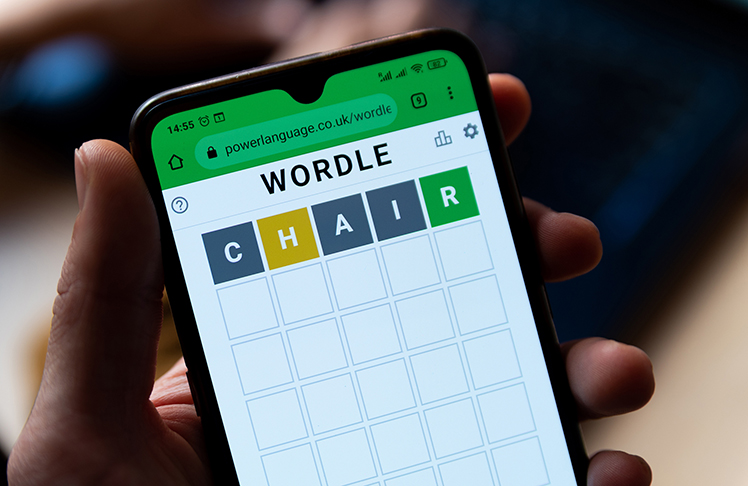
By Sandee LaMotte, CNN
(CNN) — Wordle-bragging, arguably one of the newest forms of humble-bragging, has taken over social media. Solving the five-letter daily puzzle, and doing it in only three, two or even your first attempt (!) is a badge of pride for many.
But does being good at Wordle mean you’re smarter than the average person, or even a fellow puzzler?
“No,” said memory and learning researcher Aaron Seitz, a professor of psychology at the University of California, Riverside, who founded the university’s Brain Game Center. “You’re just a person who does well at Wordle versusanother person who doesn’t do as well on Wordle.”
It’s much like people who are really good at Scrabble, so good that they compete in international tournaments, said Penny Pexman, a professor of psychology at the University of Calgary, who has studied the brains of Scrabble players.
“Scrabble players recognize words faster, especially in vertical orientation, but we didn’t find that those advantages transferred to non-Scrabble-related tasks,” Pexman said. “As soon as you show them some other kind of visual pattern or symbol that’s not a letter, they look just like non-experts.”
The same applies to chess, she said. If chess pieces are not in their legal positions or if other information is presented on a chessboard, the player’s ability to visually scan and understand the board is no better than average.
“With brain training, the benefits are mostly quite specific,” Pexman said.
That’s why it’s unlikely that “getting very, very good at Wordle” would make your brain “very good at anything else,” said cognitive psychologist Jonathan King, senior scientific advisor to the director of the Division of Behavioral and Social Research at the National Institute on Aging, which funds brain-training research.
And if you’re playing Wordle in the hopes it might keep your brain from aging, research so far isn’t showing any significant widespread protection from vmost brain-training games, King added.
“That’s a problem that we have with cognitive training in general,” King said. “It’s hard to find training that translates to a long-term change in the brain that will hopefully protect you from cognitive impairment or decline or dementia.”
Maximizing Wordle’s benefits
Many people who enjoy doing Wordle, Scrabble, crossword or other types of puzzles are often high in what psychologists call a “need for cognition,” Pexman said.
“Some people just enjoy puzzles,” she said. “And we know that a need for cognition is different than intelligence. So it’s not necessarily something you do because you’re smart, it’s something you do because that’s what you enjoy.”
Playing Wordle is unlike playing crossword puzzles, King said, because you don’t need to know the meanings of words or even have a large vocabulary.
“It’s all five-letter words. But that said, you do need to be able to do a lot with those five-letter words,” King said. “We usually think of something like this is a deductive-reasoning task, which would probably be associated with activity in the frontal and prefrontal lobes of the brain.”
The visual working memory area of the brain, which is lodged in the prefrontal cortex region above the forehead, is definitely involved, Pexman said.
“It’s like a mental sketch pad where you hold the visual information in mind and you manipulate it, which is a particular skill some people have a lot of capacity for and other people less so,” Pexman said.
In addition to manipulating information in memory over a short period of time, “your ability to have attentional focus is also very much involved,” Seitz said.
While Wordle may be exercising the specific brain “muscles” of visual memory and attention, applying strategies such as (SPOILER ALERT) the use of words with lots of vowels or a database of five-letter words may soon let that muscle atrophy, he said.
“As soon as you begin using strategies to solve the puzzle, you’ve taken the load off of your attention and memory processes which may lessen Wordle’s potential benefits,” Seitz said.
“My general advice is to pick a brain activity that provides a challenge,” he added. “Then when you start feeling like you’re really good at it, pick another activity that gives you a new challenge. And so by kind of rotating across these different types of challenges, you get the variety that’s going to exercise your brain in different ways.”
Not a Wordle fan?
Not into word or puzzle games? That’s OK, psychologists say. Research has identified many other activities that can provide just as much of a boost to the brain.
“If I was going to recommend one thing to people to ensure healthy brain aging, I would say exercise,” Pexman said. “All of the positive effects of healthy blood flow on cognition are very well established.”
Dancing is an excellent choice, she added, because it not only engages cognitive spatial skills, but also adds social interaction, which research has also shown to be key to staying cognitively alert.
Research is beginning to show other activities work as well, Seitz added, such as learning to play a musical instrument, learning a second language or how to paint, cook and do photography.
“When people ask my advice about a strategy for a healthier brain I tell them that given what we know right now, learn a new thing every day,” Seitz said.
“I always say that if you take one finger and lift weights with it every single day, you’ll have a really strong finger. That applies to the brain as well, so challenge your brain in different ways.”
The-CNN-Wire
™ & © 2022 Cable News Network, Inc., a WarnerMedia Company. All rights reserved.















